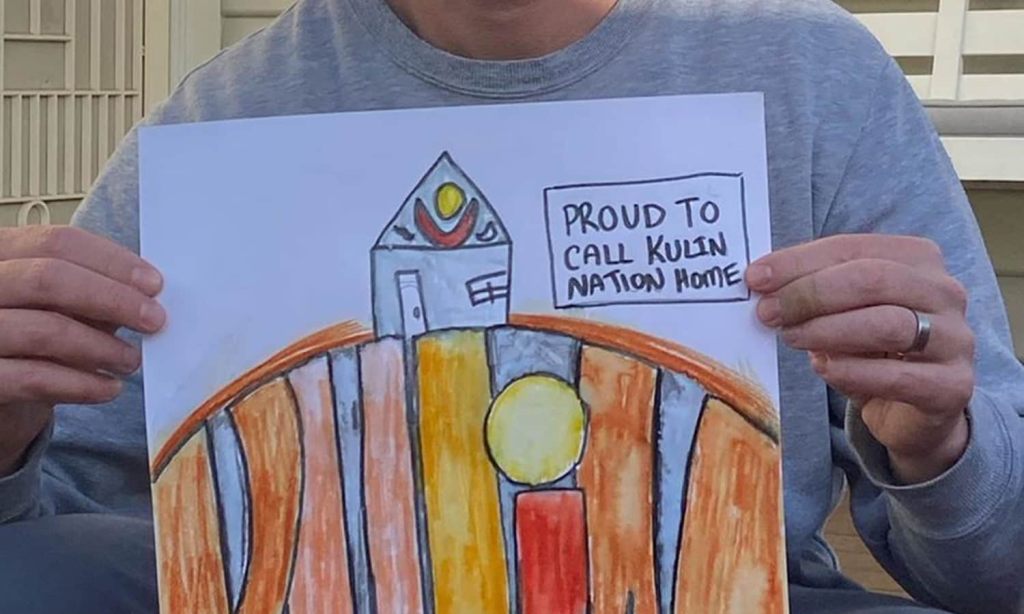Do you know the name and culture of the Traditional land in which your home sits?
A new initiative from CultureUp! is working to help Australians better understand the history and culture of First Nations People, by encouraging the creation of signs that acknowledge the Traditional name of the land we live and work on.
The ‘Signs of Respect’ initiative was thought out as a simple, creative and wonderful way to encourage people to stand with Indigenous Australians; “to listen, to learn, show respect, and make lasting change”.
Developed in collaboration with Traditional Cultural Practices, an Elder-led NGO, ‘Signs of Respect’ asks the community to create homemade signs acknowledging the Traditional lands they live and work on, before these signs are proudly displayed in or outside their homes, workplaces and on their social media platforms.
In order to make yours, all you need to do is visit the ‘Signs of Respect’ portal on CultureUp!, where you can first find out the name of the Traditional land you’re living on using the AIATSIS map.
Next, you create your sign using any art supplies you may have around the house. There are no limits as to how you create your work, but CultureUp! has written a guide with examples for how you might like to phrase your sign. A few examples are below:
“We are proud and grateful to be living on the land of the ……………. nation.”
“Thank you to the First Nations People of the ……………..nation where we have made our home.”
“It’s good to be living and loving on ………………… Country.”
Next, you proudly display your sign from your window, letterbox, front door, whatever you like. The campaign also suggests sharing your work on social media with the hashtag #signsofrespect, to encourage others to do the same.
https://www.instagram.com/p/CD5GtiMDDT8/
Eddie Moore is a Palawa, Wotjobaluk and Wemba Wemba man, cultural educator and the managing director of Nyuka Wara Consulting. Speaking to The Latch of the ‘Signs of Respect’ initiative, Moore says he’d love to see more signs displayed in homes around the country.
“I’ve seen some Signs of Respect throughout Victorian suburbs and I feel very proud. To see it across whole suburbs would be amazing. It shows that people care — they care about culture, the land they’re living on and the history of the First Nations people.”
The first step in the ‘Signs of Respect’ initiative is “Educate Yourself”. Moore says this is an important first step and an ongoing piece of work that will help Australians feel more connected to the history of the land.
“At its core, ‘Signs of Respect’ is about education. It asks people of all ages, backgrounds to
learn more about First Nations people and their country, language, culture, and their history,” says Moore.
“For First Nations people it can be challenging to achieve reconciliation, strength or healing when the knowledge and relationship to them and their culture is so weak.
“Learning about the land we live on enables us to become more connected to our true history, and by doing so, it allows recognition of the First Nations people, and at the same time shows respect through action.”
Moore says that to learn about Indigenous history and culture is to empathise and understand. But more than that, “it’s also about my cultural connections — kinship, memories, stories, Songlines, identity, values and beliefs”.
“For people to learn about this beyond the ‘Welcome to Country’ would mean a lot
to me and other First Nations people.”
https://www.instagram.com/p/CEqJEAIj0zx/
The events of 2020, in particular those that highlighted systemic racial injustices for BIPOC and Aboriginal deaths in custody, have encouraged so many on a journey of self-learning and education — in an effort to better understand the issues faced by minorities and become better allies.
Speaking of how we can continue ‘doing the work’ in these areas, Moore says: “Every one of us has a different level of awareness and knowledge base when it comes to Aboriginal and Torres Strait Islander history and cultures. That’s okay, no one can ever be expected to be an expert on the historical and cultural elements of every Aboriginal and Torres Strait Islander nation.
“It is more important to acknowledge this and commit to a journey of continuous learning.
Learning about Indigenous culture allows us to see a different view of the world, and as
individuals we can grow through deeper understanding of First Nations people’s history and philosophy.
“By creating conversation with friends, family and colleagues around First Nations people culture is another step forward in learning and showing respect. Read about the importance of kinship, learn about the culture, languages and stories, watch videos and speeches from First Nations peoples and become enriched in the history.”
Learn more about the ‘Signs of Respect’ initiative here, plus find educational resources and means of support and donation.
https://www.instagram.com/p/CEdr9S8jBjP/







